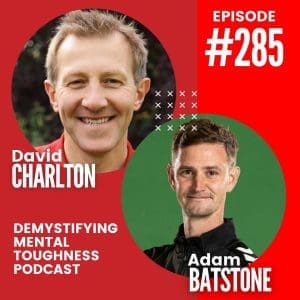23 June 2023

Helping You Gain A Mental Edge
How to Stop Mind Reading Others and Focus on Your Own Game
Do you worry too much about what others think of you?
Social approval is a very common challenges for athletes especially youngsters and can worry their parents and coaches.
For the athlete who struggles with social approval they’ll likely:
- Mind read a lot and obsess what others think about their technique.
- Fixate on what others think about how they perform.
- Fear making a mistake in case it results in team-mates or a coach shouting at them.
- Worry about taking risks because there is a chance it could mean that others will laugh or ridicule them.
- Get caught in the comparison game judging themselves, their skills, technique, training stats and performances against peers and rivals.
- Experience anxiety when other people watch them perform in pressure situations.
- Find that the way that they perform can change depending on who watches them.
- Want to win so badly so that others will notice their achievements.
- Remain on the outside of games, especially team sports because they don’t want any attention brought on themselves.
Fear of failure is often connected closely with social approval where the athlete pays way too much attention to the opinions of others in order to gain respect, friendships, appreciation, admiration, recognition and acknowledgment.
How can you become more selfish and play your sport for yourself?
This links to how and where you place your focus and attention. Focusing on the process, execution, your peak performance enablers and ingredients is key. This can be much easier said than done, given the way others (friends, rivals, coaches and parents) communicate and discuss outcomes and results.
Here’s a quick tip to help you.
Step 1: Write down the thoughts or beliefs that you have when making assumptions about what others think. Here are some examples:
- The golfer – “I wonder if my playing partners think I have a good swing?”
- The cricketer – “I wonder if they’ll laugh at me if I get a duck.”
- The footballer – “The coach will likely drop me if I make too many mistakes.”
- The gymnast – “I wonder what Freya (friend) will think of me if I beat her today.”
- The netball player – “If I keep missing my team-mates think I’m rubbish.”
Step 2: Now look to change this thought or belief and introduce a refocus statement that will help you play your sport more selfishly and focus on the task in hand only and your performance. Here are the counter examples based on the above scenario’s.
- The golfer – “Some days I’ll swing it bad, but I can choose to find a way to get around the best I can.”
- The cricketer – “I’ll commit to my shots regardless.”
- The footballer – “I’m going to be brave and keep demanding the ball even if I make some mistakes.”
- The gymnast – “My friendship is strong with Freya (friend), if she’s disappointed we can talk about it afterwards. I’m going to focus on me only and do my best when I compete”
- The netball player – “If I miss yet keep trying my best I’ll feel good in myself knowing I did all I could.”
8 BONUS TIP’S
1. Why do you care so much about others’ opinions of you. To gain an understanding of what you “need” from others will help you put a stop to some of the irrational and arguably “bizarre” assumptions that you make. What do you “need” from others?
2. Try your best to stop mind reading, it’s important to be aware when you begin to engage in mind reading and then look to refocus on the process for your shot, pass or kick and your routines.
3. It’s reality check time. How do you know what others are truly thinking about you? Test out your assumptions and have conversations with friends about what they think about your game when you play well or poorly.
4. View our posts in The Sports Psychology Hub where we and other well qualified practitioners share tips to overcome social approval including:

Tune into the latest Demystifying Mental Toughness Podcast Episode
This week’s I discuss social approval and mind-reading in a short solo episode sharing case studies and a number of great questions that you can ask yourself in this regard.
6. You could also listen to our library of podcast episodes including these one’s which have links with ego and social approval in parts.
Ep017: Gio Valiante – How to Play Fearless Golf
Ep095: David Charlton – David on Being Tough Vs Being Comfortable in Your Own Skin Final Part
Ep112: David Charlton – How to Deal with Physical Insecurities as a Young Athlete
Ep131 David Charlton – How to Deal with Self-Criticism using Self Compassion – FINAL PART
Ep142: Alessia Bruno – Is Striving for Perfection a Good Thing in Gymnastics?
7. You could read some of our throwback blogs too so that you focus on your own game.
Blog: Coach Development Helping Athletes Overcome Fear Of Failure
Blog: 5 Ways To Create A Psychological Safe Sporting Environment
Blog: How To Play Well When You Aren’t Feeling Great
Blog: Does Your Warm Up Influence How You Perform?
8. Read an article I was asked to contribute in The National, an online e-paper created in Dubai, United Arab Emirates.
3 WAYS TO LEARN MORE ABOUT OUR WORK:

Best Wishes
David Charlton
Online Sports Psychologist | Mental Performance Coach who supports many highly motivated athletes, young and old, developing their skills or who are already highly skilled so that they gain a mental edge and get the most from their talent across the globe from USA/Canada to Great Britain and Ireland to UAE, South Africa, Australia and New Zealand, using ONLINE Video Conferencing.
Managing Director – Inspiring Sporting Excellence
Host of Demystifying Mental Toughness Podcast
Founder of The Sports Psychology Hub
Author of The Mental Edge
With over a decades’ experience supporting athletes, coaches, parents and teams to transfer their skills from training to competitive situations, under pressure.
T: +44 7734 697769







